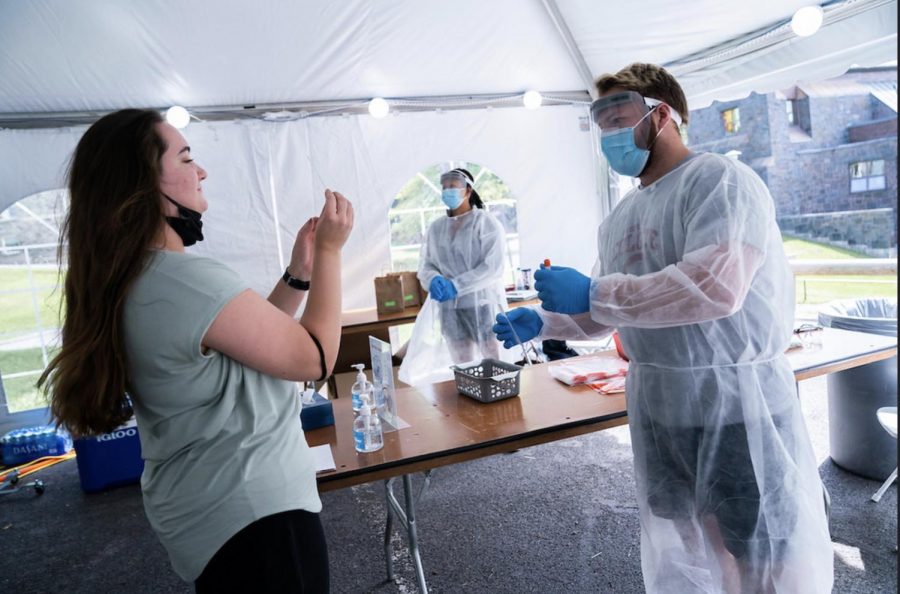Students Return to a New Normal
As students and faculty return to campus, most are anticipating a “new normal” at Colgate for the first time since the University initially shifted to entirely virtual instruction in March 2020. With the introduction of COVID-19 vaccines last spring, the University has scaled back its prevention policies, rather than focusing on instating policies that adapt with the vaccination status and infection rate within our community.
For the Fall 2021 semester, Colgate University required all students to be vaccinated against COVID-19 in order to return to campus “unless granted a medical or religious exemption in accordance with the established University processes in place,” according to the newly updated Student Commitment to Community Health.
Director of Student Health Services and Student Health Services Physician, Dr. Merrill Miller, sent an email to the University community on June 17, 2021, detailing several changes to campus-wide COVID-19 prevention measures following a meeting with Colgate’s Health Analytics Team in light of former Governor Andrew Cuomo’s lifting of restrictions in New York State.
“Fully vaccinated individuals are no longer required to wear face coverings or maintain physical distancing in most settings on the campus,” Miller said. Furthermore, limits on indoor and outdoor gatherings involving Colgate’s community members will no longer be in effect, along with offices, classrooms, laboratories, restrooms and dining facilities being able to return to full capacity according to the email.
Miller also noted exceptions to such changes, keeping in mind particular situations with increased risk of infection.
“All unvaccinated individuals are expected to wear a face-covering on campus while indoors and in any setting where physical distancing cannot be maintained,” Miller said. In addition, “public and on-campus mass transportation, including the Colgate Cruiser, still require physical distancing and face coverings for all passengers per federal guidelines.”
Unvaccinated individuals are required to undergo weekly surveillance testing throughout the duration of the semester according to Colgate’s Covid-19 Vaccine Requirement Information web page.
First-round and second-round COVID-19 tests were required for all students upon their arrival to campus, according to an email sent by Vice President for Communications Laura Jack on August 6, 2021.
As of September 5, 2021, 96% of students and faculty are fully vaccinated, according to the Health Analytics Dashboard. Of 3,190 on-campus students, there are 44 active student cases of COVID-19. Of 1,244 on-campus employees, there are 2 active employee cases of COVID-19.
The most up-to-date number of COVID-19 cases on campus can be found on Colgate’s Health Analytics Dashboard.
As of September 3, 2021, there were 128 active cases of COVID-19 in Madison County, according to the county’s local COVID-19 statistics web page.
According to the Student Commitment to Community Health, students are required to wear masks at the request of a professor or faculty member within the classroom or office space.
A professor who wished to remain anonymous due to the sensitive nature of this issue on campus weighed in on masking in the classroom.
“Among people [faculty] that I know, masks are mandatory indoors when social distancing is not possible,” the professor said. “If it’s like in the past that we have zero cases on campus and in the village, then people are more open to making it [masking] optional.”
The professor also expressed their opinion about Colgate’s decision not to instate a universal mask policy for indoor academic spaces. At the time, the University had not updated its COVID-19 policy to require masking in all indoor spaces.
“I think the mask effort has to be a collective effort in some sense,” the professor said. “If in some scenarios people are masked but in others, they are not, it [the policy] may not be as effective.”
Sophomore Keiona Williams gave her input on the risks of traveling off-campus and coming into contact with the virus.
“When you leave campus there still is a possibility of getting the virus on your hands […] although you may not intend to get it […] and we don’t know if the vaccines protect against the two variants that are here and still to come,” Williams said. “My only concern is that I think there should still be testing either once a week or every two weeks just for people who do leave, I want to leave campus too, but I think we should be safe about it.”
Junior Sofia Ditullio feels that communication this year feels different than it was in the 2020-2021 academic year.
“I think last year the communication was better because everyone was nervous and the school knew that and was trying to make everything very clear, especially with the Laura Jack emails that would come out every week,” Ditullio said. “I feel now that [communication] is a little less clear-cut, but I believe they still are trying… the regulations aren’t across the board anymore.”
With the return of in-person learning and events, the campus feels more alive, according to Ditullio.
“It’s not the same to focus in your room as it is to focus in a classroom and I feel like everyone knows that,” Ditullio said. “It feels more like my freshman year now; it feels like campus is coming back to life.”

Sydney Henderson is a senior from Whitesboro, NY concentrating in economics. She has previously served as a staff writer for the news section. On campus,...







